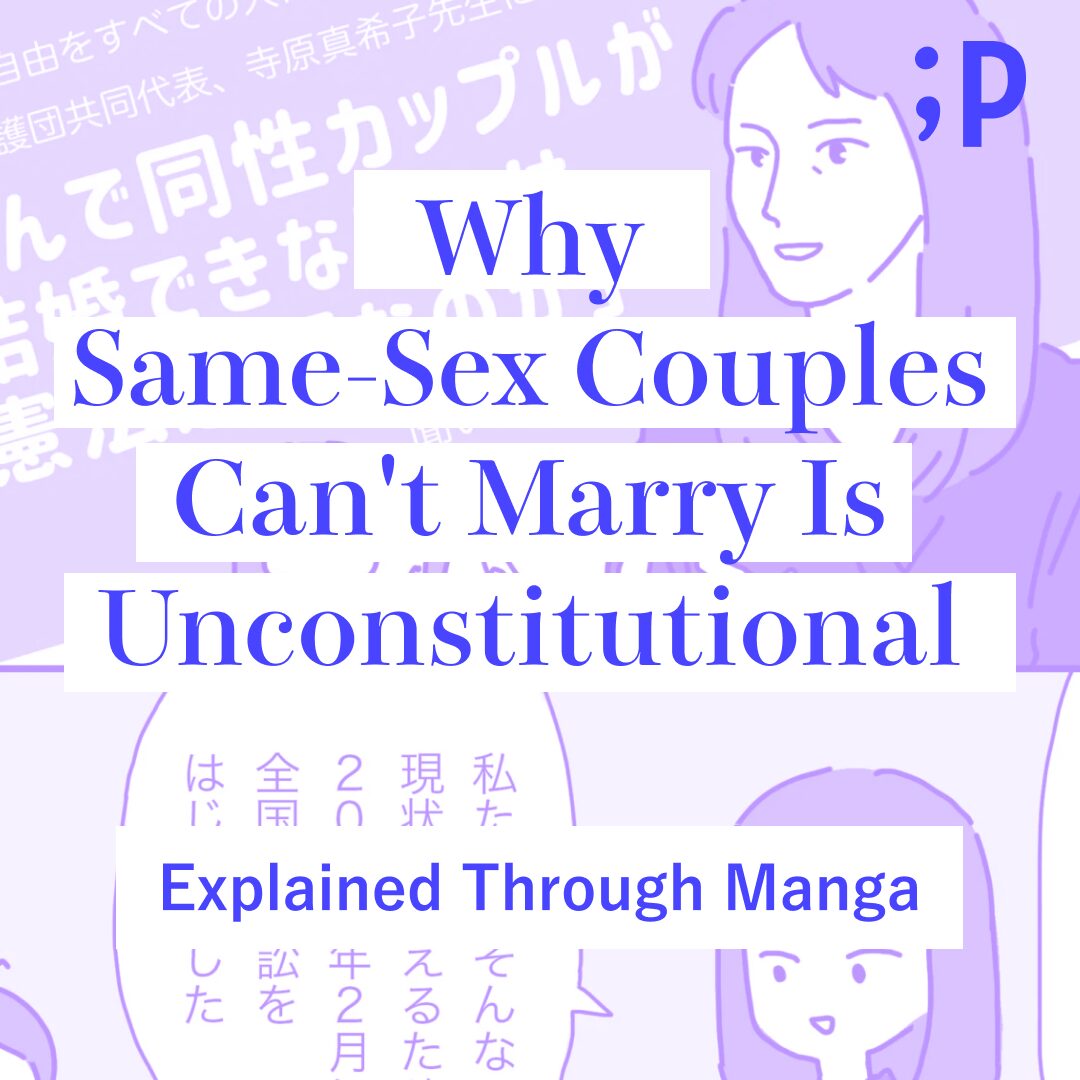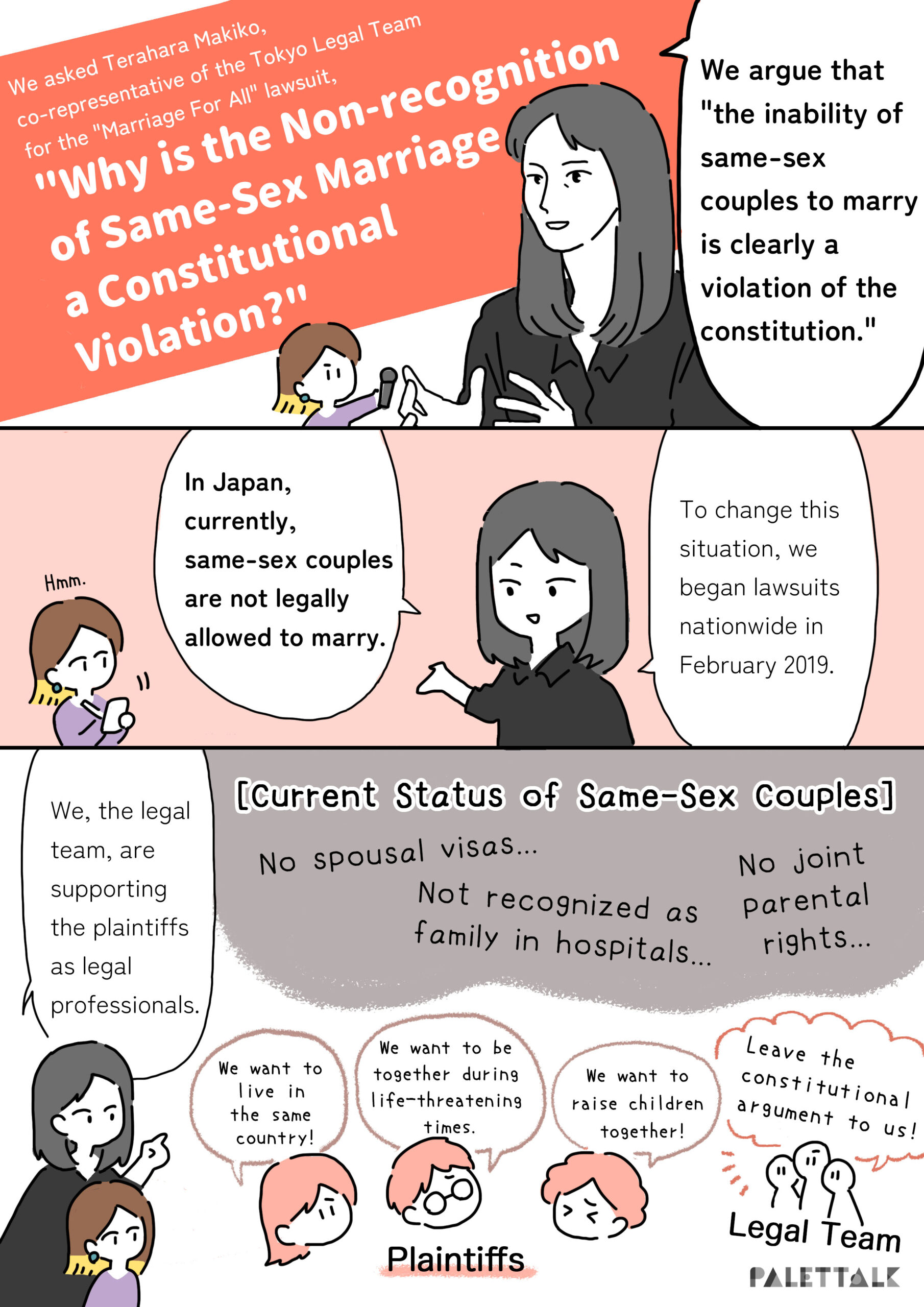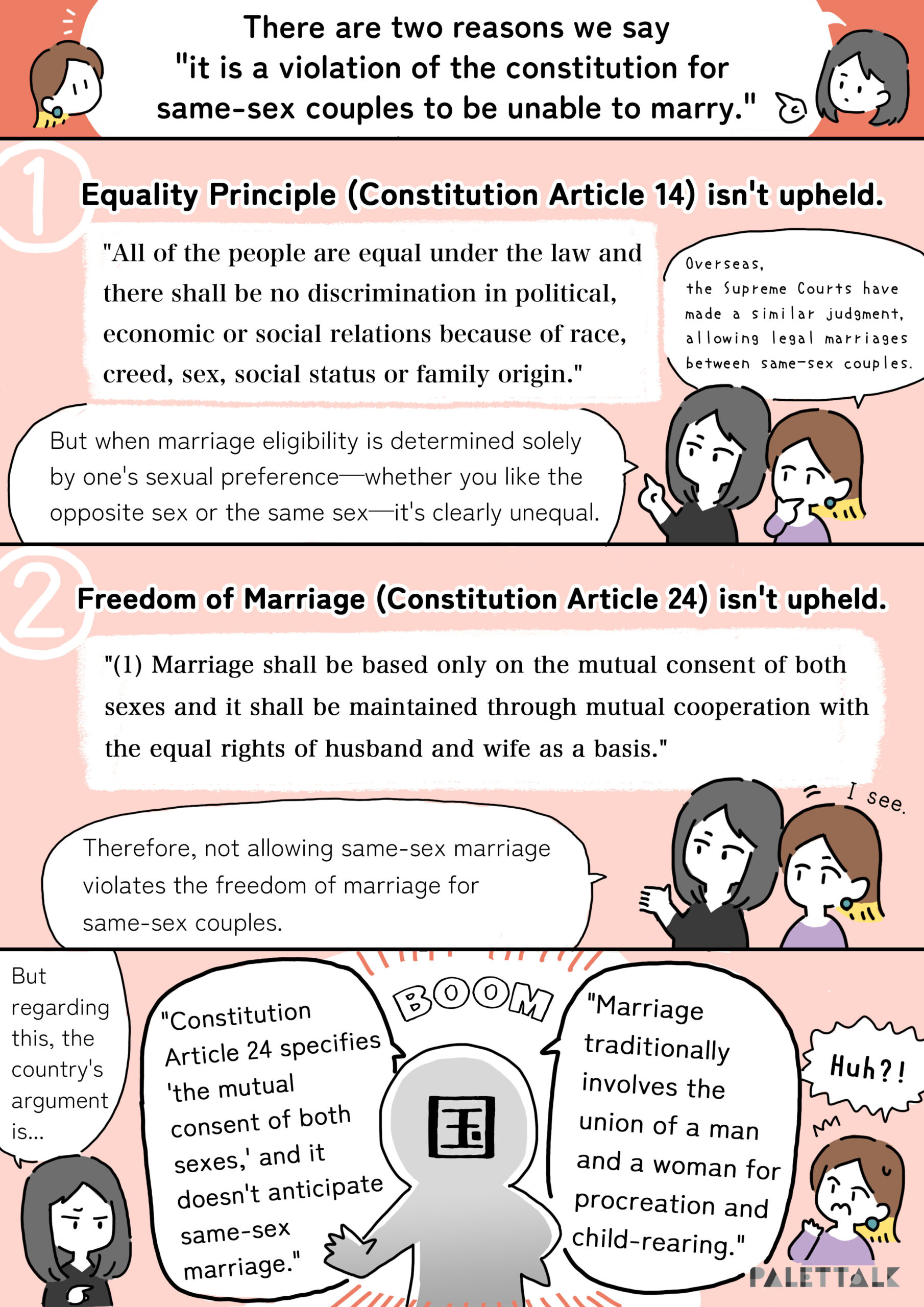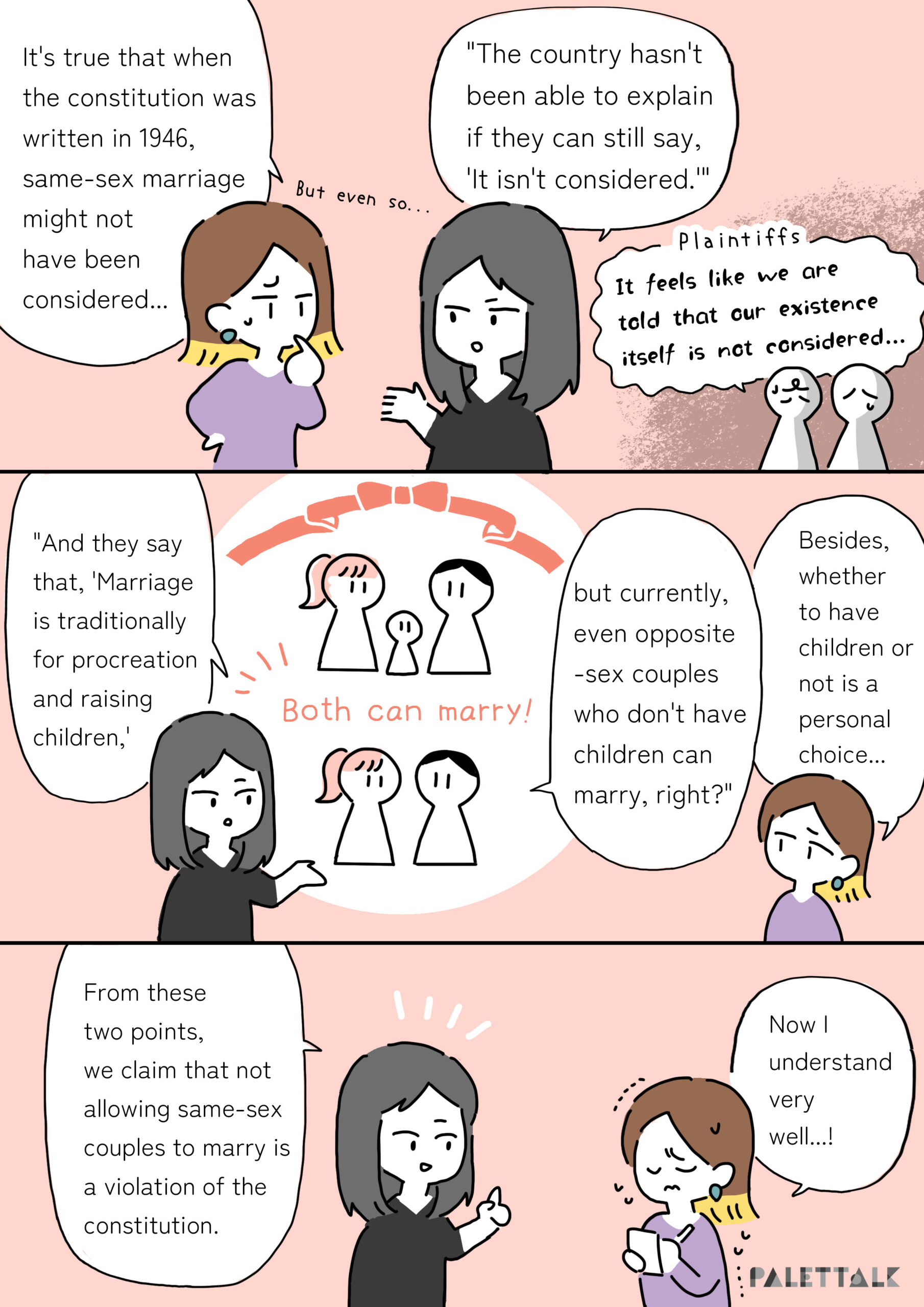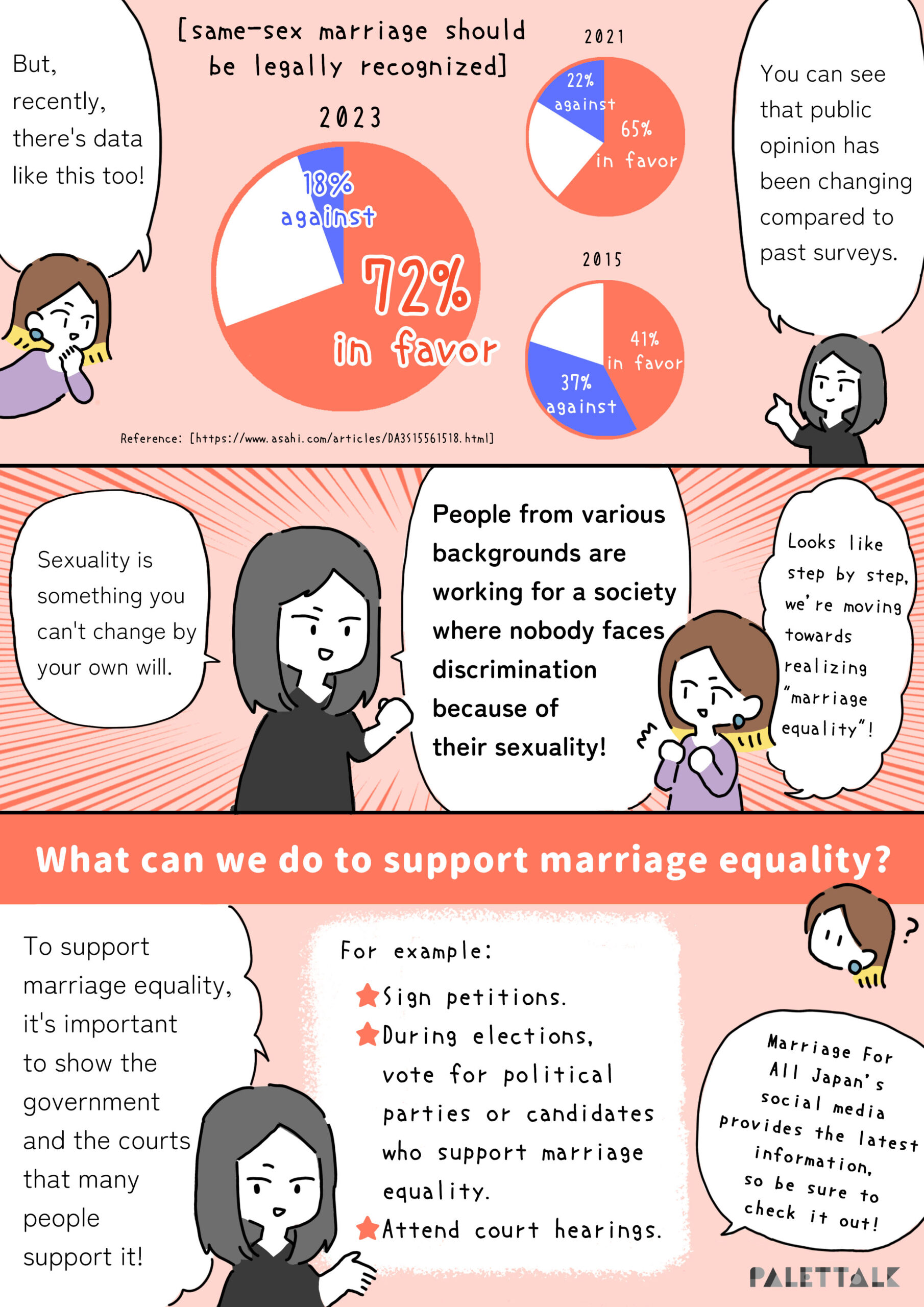【Manga】What does it mean that “Same-Sex Couples Can’t Marry Is Unconstitutional”?
“Marriage for All”
A same-sex marriage lawsuit began across Japan in February 2019, seeking the freedom for same-sex couples to marry. The lawsuit has been progressing nationwide, gaining attention in various places. Since the content of the constitution is complex and challenging, many might not understand why same-sex marriage being unpermitted is considered a violation of the constitution.
So, we went to ask Makiko Terahara, the co-representative of the Tokyo Defense Team, why the current situation of same-sex marriage not being allowed is considered unconstitutional.
We’ll explain each of the key points, namely, Article 14, and Article 24 of the constitution, along with manga illustrations.
Why the Non-recognition of Same-Sex Marriage Is a Constitutional Violation
The plaintiffs advocating for the realization of same-sex marriage believe that the current laws not allowing same-sex marriage violate the constitution. In the previous hearings, they argued that “Article 14” and “Article 24, Paragraph 1” of the Constitution were the reasons behind this belief.
We’ll explain the key points of both Article 14 and Article 24, Paragraph 1 of the Constitution.
Point 1: Article 14 of the Constitution (Principle of Equality)
This article establishes the principle of equality, stating that “every person is guaranteed equal rights under the law, regardless of race, sex, religion, and other factors.”
However, in reality, while opposite-sex couples are allowed to marry, same-sex couples are not. Marriage freedom is granted or denied based on an unchangeable sexual orientation, which determines whom you love.
This is why it can be said that “the current laws not recognizing the freedom of same-sex couples to marry are a violation of the constitution.”
In fact, a ruling in March 2021 by the Sapporo District Court declared that the current non-recognition of same-sex marriage violates Article 14 of the Constitution.
You can read more about the unconstitutional ruling in this article.
Point 2: Article 24, Paragraph 1 of the Constitution (Equality of Marriage)
This article guarantees freedom of marriage. It establishes that marriage is based “only on the mutual consent of both sexes.” In other words, if two people who want to marry express their intent to marry, they should be able to get married. Conversely, it also means that anyone other than these two individuals cannot force or oppose the marriage.
When this constitution was enacted, the concept of the “family system” was deeply rooted in Japanese society, and marriage was often seen as the “union of families.” In many cases, marriages were decided by the most respected family head.
In this context, Article 24, Paragraph 1 of the Constitution was established to respect individual wishes and guarantee the freedom of marriage. So, here as well, it can be argued that “the current laws not recognizing the freedom of same-sex couples to marry are a violation of the constitution.”
You might wonder, “It says ‘both sexes,’ so does this only apply to men and women?” It is written this way because, at the time when the constitution was enacted, same-sex couples were not considered. However, the understanding of the world now recognizes the diversity of sexual orientations, including same-sex love.
It is not the government’s position that “Article 24, Paragraph 1 of the Constitution prohibits same-sex marriage.” For more information, you can read the following articles:
- “What I Felt from Observing the Same-Sex Marriage Lawsuit – Toward a Society Where Everyone Is ‘Considered'”
- “Is Marriage Truly Only for the Purpose of Bearing and Raising Children? – Observing the Third Hearing of the Same-Sex Marriage Lawsuit”
Point 3: Article 24, Paragraph 2 of the Constitution
Furthermore, during the 4th hearing held in Tokyo District Court in February 2020, the plaintiffs pointed out a third reason. This reason relates to Article 24, Paragraph 2 of the Constitution, which states, “laws concerning marriage shall be enacted from the standpoint of individual dignity.”
The argument made by the plaintiffs is whether the existing law, which only recognizes marriage between different sexes, violates the individual dignity of LGBTQ+ people.
Let’s take a closer look at the reasons:
- Marriage, as a system, is closely tied to important rights in Japanese society, such as inheritance, joint custody, and residency status. Not recognizing these rights for LGBTQ+ individuals harms their dignity.
- Not allowing marriage based on an unchangeable core aspect of a person’s identity, their sexual orientation, violates individual dignity.
- The situation where marriage equality is denied indefinitely unless the system changes itself harms individual dignity.
- The existence of laws that do not recognize same-sex marriage fosters prejudice, implying that same-sex couples are inferior to different-sex couples, thus undermining the dignity of LGBTQ+ individuals.
In essence, the current situation where same-sex marriage is not recognized directly injures the personal dignity of LGBTQ+ individuals. Moreover, it sends a message that “same-sex love is inferior to heterosexual love.” This lack of recognition of same-sex marriage makes it challenging for many individuals to envision their future life paths.
Ensuring a Law That Respects Everyone
We’ve explained why the current situation of not recognizing same-sex marriage is considered a violation of the constitution. The constitution itself is created with the purpose of respecting each of us as individuals. Can we say that current marriage laws respect the personal dignity of same-sex couples?
The realization of same-sex marriage doesn’t mean that all LGBTQ+ individuals must get married. Nor is it about seeking special privileges.
What allowing same-sex marriage does is make it possible for LGBTQ+ individuals to have the same choice as heterosexual individuals: to marry or not to marry, just as a matter of course.
The same-sex marriage lawsuit will continue. Within the law, within the courts, and within society, no one’s dignity should be disregarded. Toward such a society, Palettalk will continue to support “Marriage for All – The Same-Sex Marriage Lawsuit!”
(Translation: Jennifer Martin)

